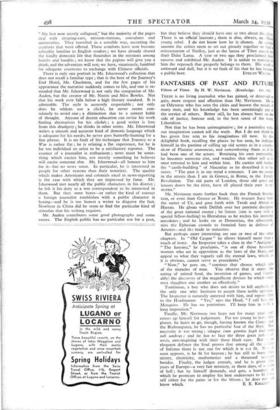FANTASIES OF PAST AND FUTURE
Films of Time. By H. W. Nevinson. (Routledge. xos. 6d.) THERE is no living journalist who has gained, or deserved to gain, more respect and affection than Mr. _Nevinson. He is an Odysseus who has seen the cities and known the minds of many men, and his knowledge has been unstintingly put at the service of others. Better still, he has always been on the side of justice, honour and, in the best sense of the word, Liberalism.
Not that he has been unimaginative ; for a journalist with. out imagination cannot tell the truth. But I do not think he has given free rein to his imagination till now. In this delightful book, recalling the places he has seen, he indulges himself in the pastime of calling up old scenes as in a cinema. show of Platonic anamnesis, and remembering them as if he had been one of the actors. Retaining his own personality, he becomes someone else, and watches that other self as at once external to him and within him. He carries still further the " castle-building " of Macaulay as he described it to his sister. "The past is in my mind a romance. I am no sooner in the streets than I am in Greece, in Rome, in the French Revolution. The old parts of London, those old gates and houses down by the river, have all played their part in me stories."
Mr. Nevinson starts further back than the French Revolu- tion, or even than Greece or itome. He rescues Sarai from the suttee of Ur, and goes forth with Terah and Abram to Harran. He gloats with Delilah over her patriotic deception of the great national enemy ; he listens (one is sure with a special fellow-feeling) to Herodotus as he recites his immortal anecdotes ; and he looks on as Demetrius, the silversmith, stirs the Ephesian crowds to frenzied fury in defence of Artemis—and the. trade in statuettes.
But perhaps more interesting are one or two of the other chapters. In "Old Caspar" he allows himself more than a touch of irony. An Inspector takes a class in the "Antigone.' "The heroine," he proclaims, "is one of those hysterical women who act in opposition to the laws of the State, and appeal to what they vaguely call the eternal laws, which, as it is obvious, cannot serve as precedents." "Now," he goes on, "construe that chorus which tells of the miracles of man. You observe that it omits the eating of animal food, the invention of games, and (inevit- ably) the discovery of the magnificent devices by which today men slaughter one another so effectively." Totnlinson, a boy who does not desire to kill anyboas, is the only one who hesitates to accept these noble opi n10115. The Inspector is naturally annoyed with him, and report, hiro to the Headmaster. "Yes," says the Head, "I call birl the Mosquito. He has no patriotism. I'll keep him in v..th a long imposition." Finally, Mr. Nevinson (we hope not for many year yet) comes up himself for judgement. Far too young to lea' this planet, he hates to go, though, having known the Cong, and the Brahmaputra, he has no particular fear of the Styx But necessity is too strong ; vita que cum gemitu fugit .nala sub umbras ; and he has to face the three great jud:. • of souls, awe-inspiring with their three black caps. But 311 eloquent defence the Soul proves that among all the of Inferno there is not one for which it is yet fit. IC. r. it soon appears, is he fit for heaven ; he has still to learn „'he- tnistry, electricity, mathematics and a thousand scices besides. Finally, the judges consult, and he is given !iftY years of Europe—a very fair mimicry, in these days, of a vcle of hell ; but he himself demands, and gets, a hundred in which he promises to employ his best endeavours to fit him- self either for the pains or for the blisses ; he does not .ct














































 Previous page
Previous page